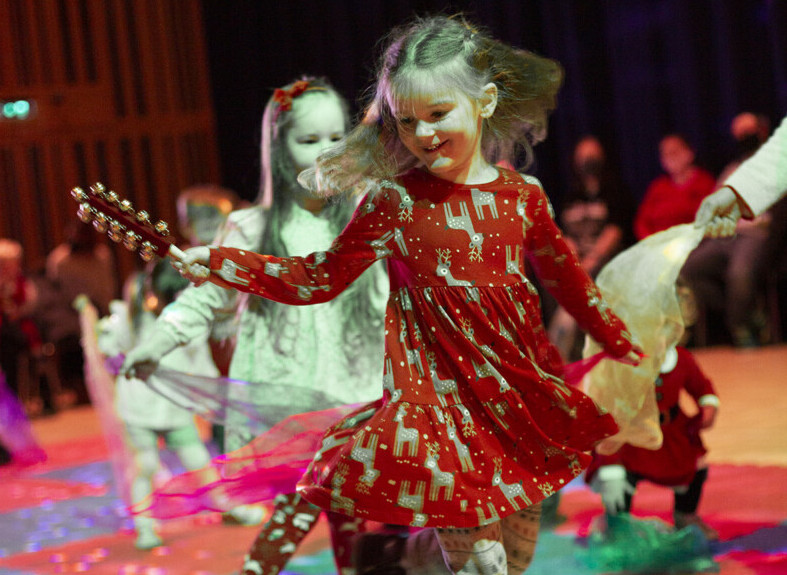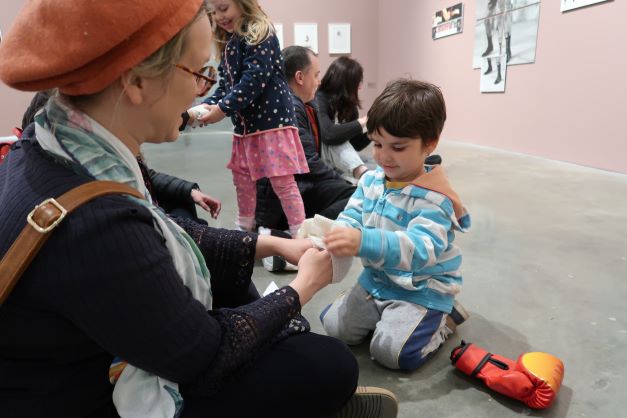Leadership:
Thoughts on Connection, Collaboration and Communities
As we look at the current challenges facing families, we consider the importance of connection, collaboration and deepening understanding of our local communities. Ahead of our National Leadership Symposium, we asked our event speakers to tell us why families matter and how better cultural leadership can make a difference.
Collaboration
Looking beyond the sector for partnership working
At the Family Arts Campaign, we’re advocates for collaboration and partnership working – with fourteen Family Arts Networks across the UK. We find the most powerful initiatives often include collaboration from outside the arts and cultural sector to help extend our reach and offer different perspectives and expertise.
Collaborating beyond the cultural sector and re-thinking co-creation is an important topic we’ve invited Mark Robinson to discuss at the Family Arts Leadership Symposium on 22 June (book tickets here). Mark Robinson is the founder of Thinking Practice, Author of ‘Tactics for the Tightrope: Creative Resilience For Creative Communities’ and previous Executive Director, North East at Arts Council England.
Why are collaborations outside the sector so beneficial?
Mark Robinson, Author, Founder of Thinking Practice
“Collaborations beyond the bubble bring different perspectives on the value people place on the arts, on the frequency they actually engage, and on the effects art in it many forms has on lives. Also, at strategic level, they can bring new funds and ideas into the mix, extend the reach of the arts sector – which is, despite all the hard work and all the achievements, still much narrower in its inclusivity than is needed.”
Communities
Listening to families and their challenges to better understand needs and barriers
In order to become truly inclusive and relevant to the communities we serve, we must deepen an understanding of the families we are trying to reach. We asked our panellists to tell us why arts leaders must better understand families in order to evolve their social practice:
Why is it important for leaders to consider the challenges families are facing?
Zoë Challenor, Founder & Director of B’Opera
“Any relationship requires an attempt to understand the challenges faced by the other person, and our work with families is no different. We need to consider what families are dealing with, in order to understand what they need from us and how they can access it.
At B’Opera, our work is increasingly collaborative – inviting families’ voices and then, crucially, really listening, opens conversation and puts us in dialogue. The art we make is part of that ongoing conversation – our response to what they have told us… We check in and ask “like this?” “Does this resonate?” And then observe as the eyes light up in unmistakable recognition, or they exhale, “That’s it!.”
The voices of our audience are not something to be scared of, as though it somehow challenges, interrupts, or threatens our work with constant change. It is the treasure in the room that we get to draw on. Engaging in this way is richer, more enjoyable, and more meaningful than the alternative. It invites true harmony – a multitude of lines complementing one another, instead of one dominant voice…
In our work we’ve been gathering mothers together to talk about birth journeys, and it’s vital that we understand the systemic inequality they face as women, mothers, refugees and people of colour, among other challenges. If their voices were welcomed, heard and listened to, this project wouldn’t be necessary.”
Tell us why you think families are in need of support, particularly from creative opportunities?
Lisa Smith, Strategic Service Manager, NSPCC
“We gained a deeper understanding of the social networks that existed for families in two specific ward areas through embedded researchers. From this, it was evident that families had limited numbers of social connections. The main reason for this lack of close friendships was a deep lack of trust in others around them. Parents had a strong pride in their ability to cope against adversity, but this made parenting and family life more difficult.
Most of the families spontaneously acknowledged that their current situation was “not great”, highlighting poor quality housing, health problems and difficulties with neighbours. Parents struggled to imagine a future that was different from their current life and had relatively few, if any, role models or connections that were doing something different from them. Few could describe stories of other people who were doing well or had managed to make any substantial positive changes in their lives. We wanted to help families explore this narrative and their own potential and introduce them to new experiences and opportunities through safe, inclusive, less stigmatising activities. Showing true and genuine interest, compassion and openness enabled us to better understand individual and community values, so a restorative approach has been front and centre of working ‘with’ families. We have maintained consistent support, to build trust in the relationship development.
Many families discussed the need for more low-cost, non-judgemental, ‘neutral’ spaces for activities and spending time together and that is exactly what we have done, getting alongside partners and the community… Creative opportunities are less scary than formalised service delivery and absolutely enable families to flourish and grow their potential, aspiration and amplify their voices.”
Lisa Smith will be a panellist at the Family Arts Leadership Symposium on 22 June, discussing ‘How can we better serve families in our communities?’
Why is it important for cultural leaders to interrogate and evolve their social practice?
Josie Moon, Writer, Educator and Arts Practitioner
“It is easy to get caught up in the ‘busy work’ of delivering projects and of course it is important that work is delivered effectively. However, cultural leaders must build in time to reflect and understand not only what they are doing but why they are doing it. Theorising the work and being your own critical friend is essential to being truly effective. Heroic leadership is hopeless – heroic leaders die in battle after all. It is a recipe for burnout and cynicism. A collegiate and relational approach will ensure that the work is not high risk, that leaders and practitioners are supported in the work and that space is created for new ideas and new people to step in.
Leadership is about creating the right conditions for everyone to flourish and thrive. This can be slow work and it can be frustrating- especially given the endless battle for resources – but slow and steady wins the race and ensures everyone remains healthy and happy in what should always be rewarding and enriching work.”
Josie, Lisa and Zoë will be taking part in the panel discussion on ‘How can we better serve families in our communities?’ at the Family Arts Leadership Symposium on 22 June.
Connection
Connecting with other leaders
With competing priorities, why does connecting with other leaders remain so important? Whilst offering a space to share ideas and inspire collaboration, connecting with other leaders also opens-up space for honest conversation, to talk through challenges and problem solve together.
We’re pleased to provide a platform for meaningful conversations and connection at the Family Arts Leadership Symposium on 22 June 2023.
Why is it important for leaders to connect and come together?
Annabel Turpin, Chief Executive & Artistic Director of ARC in Stockton on Tees, Co-Director of Future Arts Centres
“Leadership can often feel relentless but taking time out to focus on a particular aspect of your work – in this case, family engagement – is a fantastic way of breaking that cycle and injecting some fresh energy and thinking. Even though it is hard to make time, when people do, the over-riding sentiment is that they are so glad they did! It can be a great reminder of why we do this work, and a way of moving our strategic agendas forward.”
Family Arts Leadership Symposium, 22 June 2023
Join us and leaders from across the arts and cultural sector at the national Family Arts Leadership Symposium on 22 June 2023 at the MAC, Birmingham.
Tickets are limited so booking as soon as possible is advised. Ticket sales close end of 13 June.
05 June 2023




